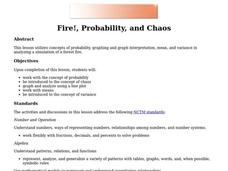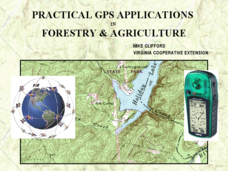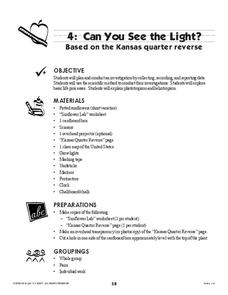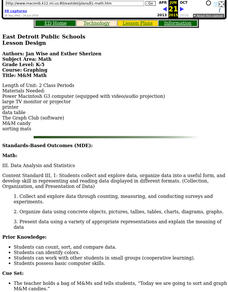Curated OER
TE Lesson: Caught in the Net
Young scholars student the concept of bycatch, the act of unintentionally catching certain living creatures using fishing equipment. They determine the difference between bycatch and target creatures. They discover what species become...
Curated OER
Leaf Weight-Loss Plan
Students measure the weight of a container of leaves daily to discover how quickly it grows lighter as the foliage dries.
Curated OER
Fire!, Probability, and Chaos
Upper elementary and middle schoolers work with the concept of probability. They are introduced to the concept of chaos. Learners graph and analyze using a line plot, work with mean, and are introduced to the concept of variance.
Curated OER
Class of Gold
How can you see a number in nature? Here, learners discover both Fibonacci numbers and the golden ratio by exploring a number of different resources. Note: Some of the resources are older and may be missing some of the links, but...
National Security Agency
Sampling for a Rock Concert
Over the course of three class periods, middle schoolers design an experiment to provide learner input to administration about which rock band to invite to play at school. They practice several random sampling exercises, all well...
Curated OER
Lesson 4 Activity 1: Mapping the Third Dimension
Students work in pairs to construct a simple stereoscope.
Curated OER
Global Economy: A Simple Activity
Young scholars explore the global economy. In this economics lesson, students examine clothing labels in search of the countries the clothing was made in. Young scholars consider the implications of a global economy.
Curated OER
Mapping Where Animals Live
What type of reptiles live in New York State? This lesson gets the class thinking about what factors determine where particular animals live. They analyze the Hudson Valley environment, identify specific reptile and amphibian...
National Gallery of Canada
Counting Circles
Learners look at bands of colors and estimate how many rings of color there are. While working in groups, they come up with a plan of how to accurately count the rings. They attempt to find a pattern in the colors, and decide whether...
Curated OER
Composting
Using 2-liter bottles, junior ecologists create composting tubes in which they place nitrogen-rich and carbon-rich materials. They observe what changes occur over two weeks' time. Provide more specific direction to your class as to what...
Curated OER
Measurement
Students create two prisms out of the same paper. They calcuate the number of centimeter cubes needed to fill each prism. They discover the concept of volume.
Curated OER
Estimation Task
Upper graders practice their estimation skills by observing different objects then making their best guess without using measuring instruments. Students are asked to estimate mass, length, volume, and area.
Curated OER
The King's Chessboard
Middle schoolers speculate on the better rate of pay: a dollar a day for 10 days, or a penny the first day, two pennies the second, doubling each day for 10 days. Start by listening to the story The King's Chessboard, by David Birch....
Curated OER
Practical GPS Applications in Forestry & Agriculture
An explanation of the Global Positioning System (GPS) and the Geographic Information System (GIS) is given in this presentation. Uses and applications are considered. How it works and sources of error are also touched upon. A large...
Curated OER
You Can't Go Wrong with a Right Triangle 2
Upper graders use the properties of right angle trignonmetry to measure objects such as the school flagpole. They solve real world problems using these properties.
Curated OER
M&M Probability
Students apply the scientific method in order to determine the probability of specific colors in a bag of M&M's. They determine the definition of probability and how it can be used. They make a hypothesis and conduct an experiment to...
Curated OER
Self Advocacy
Students determine the procedures for facilitate a self-advocacy meeting. They enter information about the meetings in a database which they include in a letter summarizes the meeting.
Curated OER
Two-Variable Linear Inequalities
Here is an engaging instructional activity on solving equations with two variables. Have the class rewrite linear equations in the slope intercept form, y=mx + b. They graph the lines using the slope and y-intercepts.
Curated OER
Can You See the Light?
Explore plants and flowers with this lesson. Learners talk about plants, conduct an experiment with suflowers, and track a plants growth. This is a motivating way to present this concept.
Curated OER
Graphing Regions: Lesson 2
Learners identify and analyze geographical locations of inventors. They each identify where their inventor is from on a U.S. map, discuss geographic patterns, and create a t-chart and graph using the Graph Club 2.0 Software.
Curated OER
Graphing Favorite Holidays
Students create spreadsheets and bar graphs based on results of survey of favorite holidays.
Curated OER
Paper Planes
In this unit, 3rd graders investigate one variable to see if they can make a paper plane fly farther. They use scatter plots to establish a possible relationship between variables then use what they have found to make a paper plane to...
Curated OER
M&M Math
Students sort a bag of M&M candies according to color using a sorting mat. They count M&M candies. They compare the number to their prediction then students create tally charts.

























